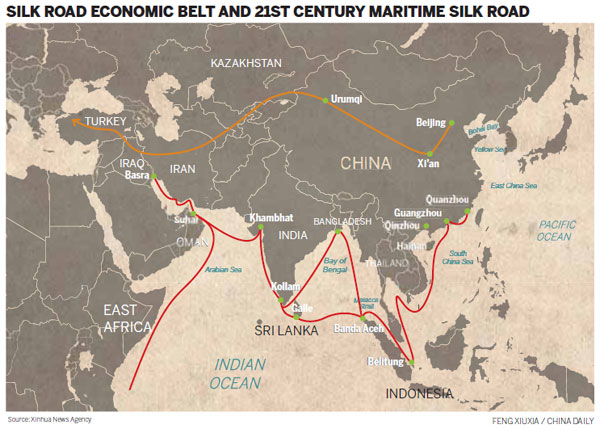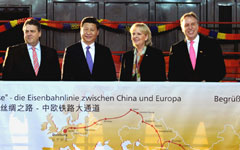
20 May, 2014
Chinese state councilor urges cooperation in Silk Road projects

(China Daily) 2014-04-11 – Asian countries should build trust and optimize development mechanisms in the spirit of regionalism to advance the Silk Road Economic Belt and the 21st Century Maritime Silk Road initiatives, a senior Chinese official said on Thursday.
 “China’s proposal for ‘The Belt and The Road’ is an open and cooperative proposal,” State Councilor Yang Jiechi said at a subforum titled “Reinventing the Silk Road” under the Boao Forum for Asia in Hainan province.
“China’s proposal for ‘The Belt and The Road’ is an open and cooperative proposal,” State Councilor Yang Jiechi said at a subforum titled “Reinventing the Silk Road” under the Boao Forum for Asia in Hainan province.
“The new Silk Road, centered on economic and cultural cooperation, aims to neither build exclusive blocs nor interfere with current multilateral frameworks,” Yang said. “The Asian land and ocean are wide, and the Asian mind is wider.”
Yang said the construction of the new Silk Road, focusing on economic and trade cooperation, will deepen trust between Asian and European countries as well as being mutually beneficial.
 |
 |
“The Silk Road, no longer just a concept in history books, has evolved into a story of modern logistics and Sino-European cooperation,” he said.In a speech in Kazakhstan in September, President Xi Jinping proposed that China and Central Asia establish a Silk Road Economic Belt, a modern and innovative version of the ancient Silk Road from more than 2,000 years ago.
One month after that, during his trip to Indonesia, Xi again voiced the idea of building a 21st Century Maritime Silk Road with Southeast Asian countries.
Xiao Lian, an expert on economic studies at the Chinese Academy of Social Sciences, said the new economic proposals, which will be able to reach more countries and regions than before, will strengthen China’s economic cooperation and trade with countries in Asia, Europe and Africa.
“In ancient times, China opened to the world through the Silk Road. Today, China still has strong demands of trade with other countries,” Xiao said.
“The land project will largely improve those countries’ transportation capabilities, and the maritime project can help ease disputes in the South China Sea between China and some Southeast Asian countries,” he said.
Yang said Europe’s interest in the old Silk Road and the modern Silk Road is not a coincidence, as the roads have brought tangible benefits to its people.
“It reflects the global rediscovery of ancient Asian civilizations and their current development potentials, as well as the new trend of cooperation between East and West against the backdrop of polarization and globalization,” he said.
Vassilios Costis, the Greek ambassador to China, said the Silk Road Economic Belt project will not only produce more opportunities for economic cooperation and trade, but also will enhance the construction of public facilities, including energy pipelines, in all participating countries.
“The projects will improve the openness among participants, and are likely to attract more countries from East Asia, South Asia and Europe to join the process. With its special geographic location (in southeastern Europe), Greece is also very interested in the two projects, especially the 21st Century Maritime Silk Road,” Costis said.Last year, trade volume between China and countries on the new initiatives reached $1 trillion, accounting for one-fourth of China’s total foreign trade turnover.
However, Yang said a “trust deficit” among Asian countries has been stunting the interconnection of the continent.
“Trust should be built on the foundation of respect for history, the path of peaceful development and respect for each other’s core interest and major concerns,” Yang said.
He said the Silk Road has built confidence in Asia’s development, with diversity and pluralism being the continent’s characteristics and advantages.
“Every civilization on the Silk Road is growing on its own soil and following its own development path, and is equal and unique. There is no need for uniformity,” Yang said. “Only based on diversity can businesspeople supply each other’s needs and can intellectuals communicate, making the world a colorful place.”
Xiao said there are also some challenges to the projects. “For instance, the security issue in Central Asia may threaten the safety of railway construction and transportation along the Silk Road in the future.”



Liked this article? Share it!